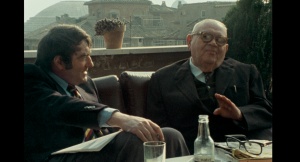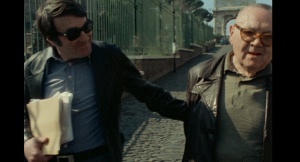The Last of the Unjust

The horror…the horror does not dissipate even after 69 years. Benjamin Murmelstein was the last “Elder of the Jews” of Theresienstadt and in many hours of revealing interviews his story unfolds under the watchful eye of master documentary filmmaker Claude Lanzmann in The Last of the Unjust. The movie confronts the terrible compromised reality of Jewish leaders under Nazi rule. Neither helpless victims nor able to escape the killer’s clutches, the leaders had to make impossible choices daily in a never ending dance with the devil. Many committed suicide or were murdered by their Nazi masters. Murmelstein survived. This is testimony from an infuriating universe of shifting grays where the clarity of black and white morality is impossible.
The narrative of Theresienstadt, the faux concentration camp set up to hide the murderous reality of the Holocaust from the world, serves as a introduction to Murmelstein’s earlier role as communal leader first in Vienna where he was forced to cooperate with Adolf Eichmann in the deportation of the Jews to ghettos and concentration camps. At each step in the horrific history, Murmelstein’s role is examined, questioned and exposed in the interviews. He defines himself as “the last of the unjust,” “a Jew in exile” in Italy out of fear of assassination in Israel, acknowledging his guilt even as he justifies his actions. As Lanzmann observes that most Jewish leaders were “caught up in some savage contradictions,” so too Murmelstein pleads that at the end of the day all such leaders were martyrs; only remember that “not all martyrs are saints.”

The movie covers myriad aspects of the Holocaust through the eyes of one who was in many ways at the heart of it. Murmelstein is credited with saving 121,000 Viennese Jews, fighting bitterly with Eichmann. He saw his role of cooperation as essential to saving as many Jewish lives as possible, and, once in Theresienstadt, with keeping the camp open at all costs for the same purpose. He claims that they didn’t know the reality of Auschwitz as a death camp until late in 1944.
The last minutes of the interviews takes place in Rome walking around the Arch of Titus, tragic testament to the destruction of the Second Temple. The historical parallel between this ancient place of Jewish memory and this witness, martyr and collaborator to contemporary Jewish tragedy is overwhelming. Murmelstein is now defensive, argumentative, accusing his detractors of cruel injustice. He finally admits, “elders (like him) can be condemned, but not judged…” Murmelstein died in Rome in 1989. We cannot afford to turn away from the horror this three and a half hour film presents.
Lincoln Plaza Cinema; 1886 Broadway @ 63rd Street, NY, NY, 212 757 0359
Opens Friday, February 7, 2014